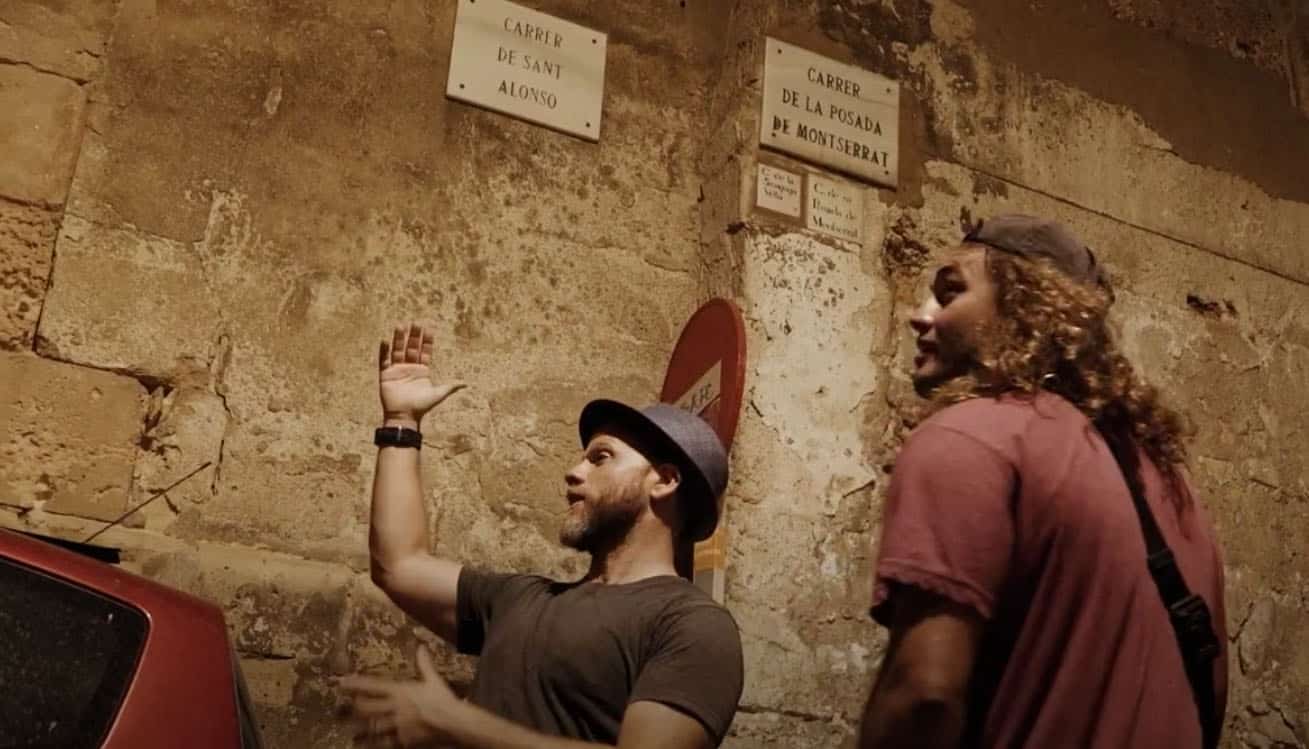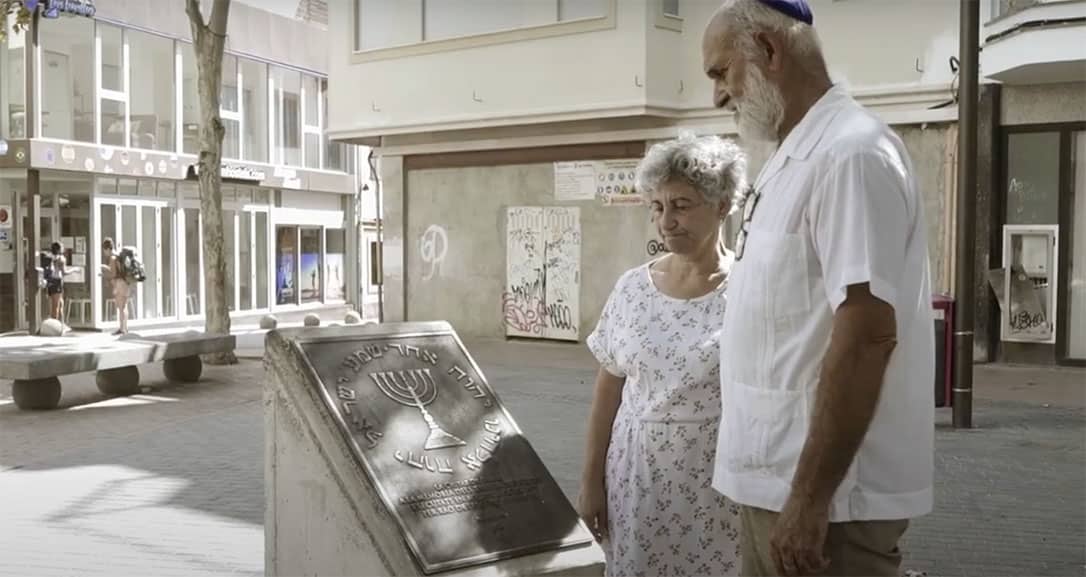 Dani Rotstein giving a tour of the Jewish history on the Spanish Island of Majorca (Photo credit – Menemsha Films)
Dani Rotstein giving a tour of the Jewish history on the Spanish Island of Majorca (Photo credit – Menemsha Films) The next time you visit Spain, set aside a day to take a $20 flight from the mainland to the island of Majorca, a Spanish Island south east of Spain’s Mediterranean coast.
But before you do, make sure to watch the Menemsha Films documentary “Xueta Island: The Lost Jews of Majorca” which explores the hidden Jewish history of Majorca dating back almost 1,000 years.
Majorca is about the size of Puerto Rico, but not nearly as populated.
The documentary’s director, Dani Rotstein, has lived in Spain for nine years and now runs a tourism business, Jewish Majorca, offering Jewish history tours on the island in six different languages.
Rotstein grew up in a Jewish home in New Jersey. After spending 15 years working as a television commercial producer, he landed a job in Majorca. Though he had lived in Madrid for an entire year and had visited Ibiza many times, he never once visited the island of Majorca.
The documentary chronicles how Rotstein first learned about the Jewish history of Majorca when he visited an Orthodox shul. It’s an exciting journey of history and how a chance encounter led to a new life mission for Rotstein.
Rotstein was inspired by the island’s secret Jewish community, known as the Xuetas, who were forced to convert to Catholicism during the Spanish Inquisition— but continued to practice Judaism in secret.
He was fascinated by the Xuetas’ determination to maintain their Jewish identity despite centuries of persecution.

The documentary also highlights the recent resurgence of Jewish life on the island over the last half century and a growing interest in Jewish heritage among the island’s residents.
While sometimes it’s spelled “Mallorca,” Rotstein says that he spells it with a ‘J’ because his tour company is “putting the ‘J’ back in Majorca.”
One fascinating part of the documentary is how during the late Middle Ages and early Renaissance, covert cooking was a way for the Jews to stay undetected while observing the laws of kashrut. In the challah department, to emphasize their “conversion” to Christianity, some Jews intentionally incorporated lard and pork fat into the bread, signifying their break from secret Judaism and their commitment to Catholicism.
And then there’s the Sabbath empanadas. They acted as a natural oven for cooking kosher ingredients like fish with scales and vegetables inside a bread—similar to a dumpling. They were prepared before Shabbat and this dish continued to cook slowly over the Sabbath, allowing it to be consumed without reheating or further cooking throughout the day. While pork was added to the top bread, it wasn’t directly mixed with the cooked contents. Instead, it was placed on top as a symbol. After returning to their homes, the pork would be removed before consumption, allowing the meal to be enjoyed without breaking the laws of kashrut.
“That’s how I’m dedicating my life, sharing the story with tourists, but also residents,” Rotstein told the Journal. “We go into public schools, tell the story of the history, we also talk about the Holocaust, and we’re trying to make Judaism more visible on the island. Luckily, now we can do that, without the Catholic church domination and Francisco Franco’s dictatorship. It’s finally a time where we can be open about our Jewishness.”
While the documentary goes into much depth about the Jewish history of Majorca, the Journal asked Rotstein several clarifying questions about the history and his journey as chronicled in “Xueta Island.” The conversation has been edited for length and clarity.
JEWISH JOURNAL: What’s the 2 minute summary of what happened to the Jews of Majorca?
DANI ROTSTEIN: After 1391, when there was this terrible attack on the Jewish Quarter of Palma [on the island], not necessarily because they were Jewish just because the rural folk in the farmlands of Majorca were being heavily taxed and just had a famine. A lot of people were dying, also because of the black plague, things were not going well economically from Majorca. So what’s the first thing you do? You look for a scapegoat, you look for someone to blame. The rural people came to the city in Majorca and they went after the noble class and the authorities. They didn’t actually go after the Jews right away. They chased all of the wealthier upper class that lived in the city, the city dwellers, they chased them to the castle where they were safe. Since they couldn’t get to the noble class, the farmers said, ‘If we can’t get to the wealthy upper class, the Nobles, well, let’s go get to the next group of city dwellers— the Jews.’ The farmers destroyed Jewish Quarters all over Majorca.
JJ: You said there was a fact you learned recently that didn’t make it into the documentary.
DR: After this terrible destruction of the Jewish Quarter where 300 men, women and children were killed, the king actually went ahead and replaced the Jews that were killed. He paid for Jews from North Africa and Portugal to come live in Palma so they wouldn’t lose the Jewish community there. That says so much. That’s the only place in the world at this time where that happened. The people who had done the killing and the massacring were really like the general public. They were being told in the churches that the Jews killed Jesus and the Jews are bad and you have to try and convert them. The king, the upper class, knew how important the Jews were. They didn’t want to lose their Jewish community—the Jews were so financially important, they were all of the money lenders because they couldn’t do anything else. So that was one of the jobs that they had, yeah. Some Jews went to North Africa. In 1435, about forty years later, there was another massacre. But this time, instead of being killed, the Jews were allowed to convert. So I don’t know about you, but for me, if I had the option of dying or converting, I’m gonna choose conversion.
JJ: How did this Jewish community have a resurgence?
DR: British Jews who started this synagogue 50 years ago. I was shocked to hear that in Catholic Spain, under Francisco Franco’s rule, there were these tiny Jewish communities basically in Madrid, Barcelona, and Majorca. In about 1971 British Jews bought a plot of land for British expats that were living there for a Jewish cemetery. They just did things like Passover and Rosh Hashana and some big holidays in a hotel that they had timeshares in. It wasn’t until 1987 that they actually opened up the synagogue that you see in the film.
JJ: Tell us about the first synagogue experience you had in Majorca.
DR: I moved there thinking that I was gonna be the only Jewish person on the island. Then I got there not knowing anyone and, speaking to friends at work at this production company I was working at. It turns out that there is a synagogue that someone told me about. I didn’t know what to expect. I didn’t know if it was going to be a Sephardic one or Ashkenazi transplants. It ended up being Ashkenazi transplants. So I went to this synagogue, and it wasn’t very welcoming at first. It was very hard to find it. There wasn’t a Facebook page, not even a website. It was just kind of like this undercover synagogue. I go inside and there’s no rabbi, it’s just like the volunteers leading the prayers. It’s an Orthodox shul. They said that they didn’t have a minyan so we had to skip the kaddish. They said there aren’t ten Jewish men, but I counted 14 men in the men’s section. I was pretty sure that the global number for minyan is 10. I asked the guy next to me, why are we skipping when there’s obviously a minyan? And he looked at me and said that not all of these men are Jewish. Some of them are Xuetas. I never heard that word before. He told me that the Xuetas are Catholic descendants—the Jewish Conversos of Majorca.
JJ: What was going through your mind when you first heard this?
DR: “You’re telling me there’s Catholics who are going to synagogue and not counting as a minyan and they come every Friday?” I was really blown away by this tiny island in the Mediterranean that not many people heard about. I was really intrigued and it took me along this journey of wanting to discover more about this specific, Jewish history of this random island in the Mediterranean called Majorca.
JJ: What are common reasons for people to move to the island?
DR: It’s a beautiful place, obviously, great health and wellness opportunities. There’s lots of retreats. A lot of yoga people go there for spirituality, training, like if you’re a big cyclist, you’re gonna want to visit Majorca. Generally good weather. If you’re a beach bum, you’ll love that place. And Myorca tends to be one of the more international cities all over Spain. After all, it has Spain’s third largest airport after Madrid and Barcelona.
Xueta Island will be screened throughout Los Angeles in early 2024. For showtimes, go to
https://xuetaislandthemovie.com/. To set up a tour with Rotstein and Jewish Majorca, go to their website: https://jewishmajorca.com/























 More news and opinions than at a Shabbat dinner, right in your inbox.
More news and opinions than at a Shabbat dinner, right in your inbox.